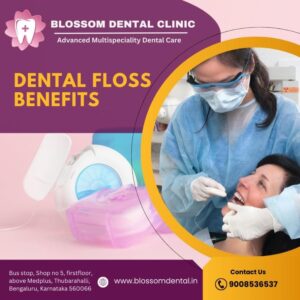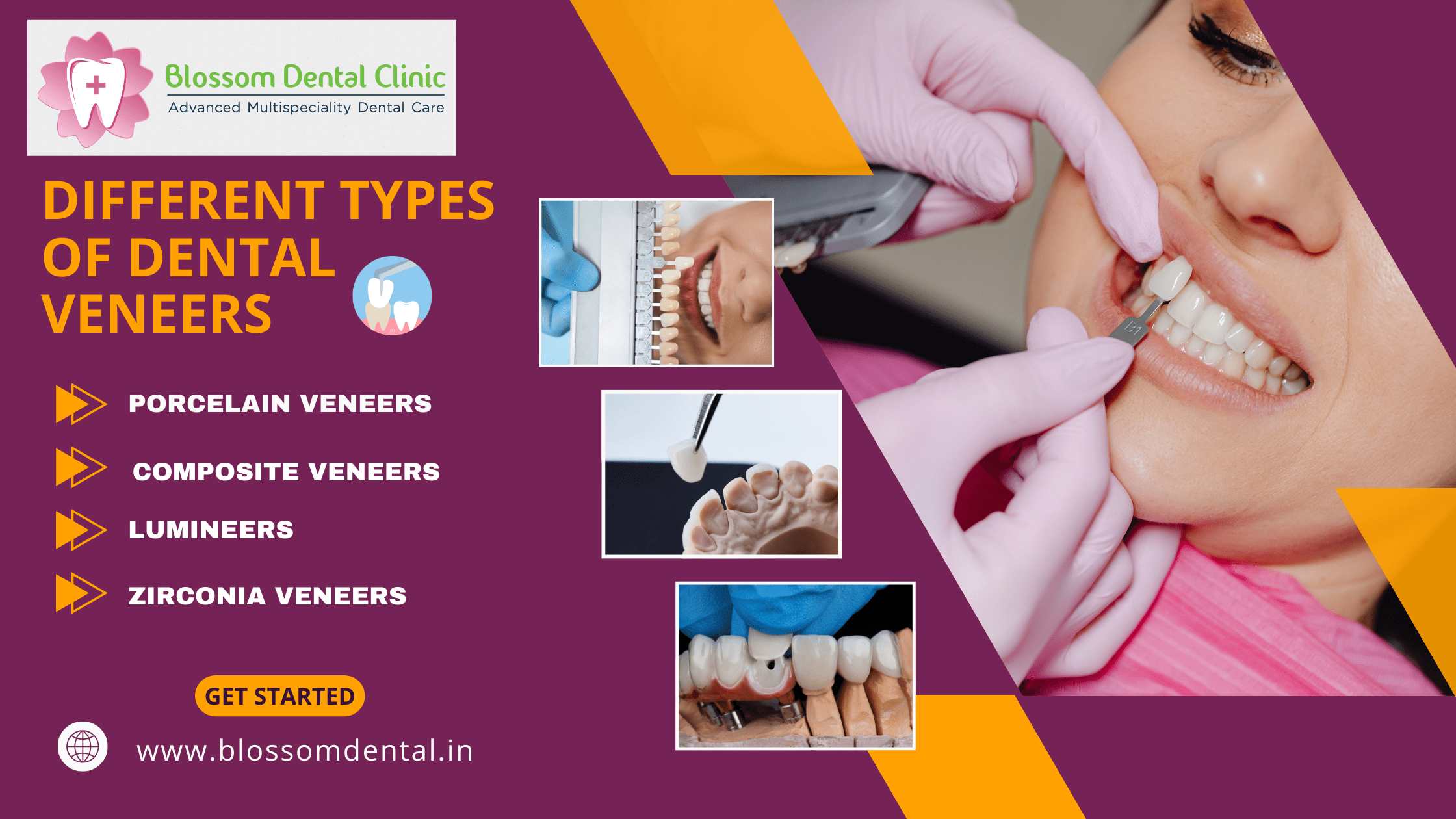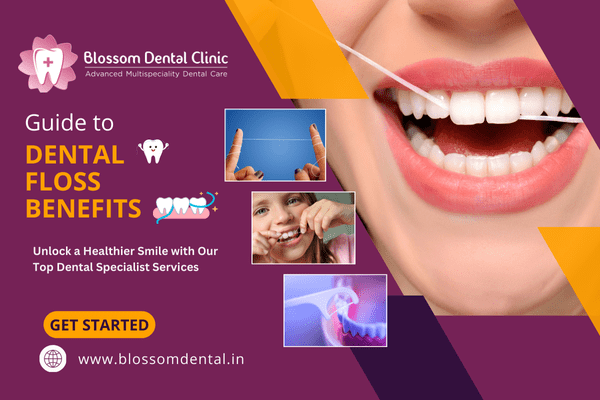Discover the top dental flossing benefits and why it is essential for your oral health. Learn how this simple hygiene habit can prevent gum disease, cavities.
Taking care of your teeth goes beyond just brushing them twice a day. While brushing is crucial for removing plaque and keeping your teeth clean, it’s not enough to maintain optimal oral health. One essential tool in the battle for a healthy mouth is dental floss. But what makes dental floss so important, and how can it transform your oral hygiene routine?
In this Ultimate Guide to Dental Floss Benefits, we’ll delve into why flossing is a vital part of your daily dental care, what advantages it brings to your oral health, and whether dental floss is actually good for your teeth. By the end of this guide, you’ll understand why dentists consistently recommend flossing and how you can make it a habit for life.
What is Dental Floss?

Dental floss is a thin, flexible thread designed to ease the tough regions between your teeth and round your gum line. These are regions that your toothbrush commonly can’t reach. Toothpaste is typically made from nylon or Teflon and is derived in waxed or unwaxed types. There also are quite a few flavors with a view to make flossing a greater exciting revel in.
Regular flossing is one of the quality ways to dispose of plaque and particles from among tooth, prevent cavities, gum disease and awful breath
Should I floss before or after brushing?
Usually floss earlier than brushing your tooth because it helps remove food particles and plaque from between your enamel. This permits your toothbrush and fluoride toothpaste to attain these regions and ease them correctly. Flossing first ensures maximum hygiene, enhancing universal oral hygiene and promoting healthy teeth and gums.
Why is Flossing So Important?
The importance of flossing can’t be overstated. Here are some main advantages of dental floss benefits that show why this simple step makes this sort of distinction in your oral care habitual:
1. Removes Plaque
Plaque is a sticky deposit of bacteria that paperwork on your teeth after consuming and drinking. If not removed, it could harden into tartar and motive ulcers and gum disorder. Brushing on my own isn’t enough to put off all plaque, in particular in tough-to-reach areas between teeth. That’s wherein toothpaste is available. Brushing your teeth each day facilitates cast off plaque before it gets worse.
2. Prevents Gum Disease
One of the most crucial dental floss benefits is its capacity to save you gum sickness. Gum ailment or gingivitis occurs whilst plaque builds up around the gums, inflicting infection, bleeding and tenderness. Over time, untreated gum disease is gingivitis, a more serious gum sickness that could result in tooth loss. Flossing regularly enables you to take away plaque from the gums, making your gums healthier and decreasing your threat of gum disorder.
3. Reduces Bad Breath
Bad breath or terrible breath can frequently be as a result of food particles between your enamel that are definitely no longer brushed away. Flossing helps do away with those debris, leaving your face clean and clean. Regular flossing can help lessen terrible breath by using controlling bacterial counts.
4. Lowers the Risk of Cavities
When bacteria in your mouth consume sugar and produce acids that harm your tooth enamel, cavities shape. By putting off food particle and plaque from among your enamel, flossing enables reduce the risk of chipping in tough-to-reach regions of your toothbrush so decreased
5. Supports Overall Health
Your oral fitness is intently connected to your typical health. Studies have linked gum disease to severe situations along with heart sickness, diabetes and breathing ailment. Regularly helps prevent gum disease and can reduce your danger of growing those systemic health issues, making it one of the most vital dental floss benefits for your enamel to your usual well-being.
Is Dental Floss Good for Teeth?
You may be wondering, is dental floss good for teeth? The quick solution is certain! Brushing your teeth is crucial for healthful teeth and gums. However, it’s essential to apply the proper technique to keep away from potential issues.
Be mild at the same time as flossing to keep away from stressful or bad teeth. Here’s a way to floss well.
- Remove the floss from about 18 inches and wind round your arms.
- Embrace your enamel and gently press a C-form among your enamel
- Floss up and down ensuring it is going below the gum line.
- Use a fresh section of floss for each tooth.
By flossing well, you will not high-quality maintain your teeth clean but defend them from plaque buildup, decay and gum issues. Many humans ask if flossing may be risky, however an unsuitable method is the principal purpose. Proper brushing is good for your enamel and promotes lengthy-term oral health.
How Often Should You Floss?
Often flossing may be not noted despite the fact that brushing your teeth twice a day is a given. Dentists advocate flossing at least once a day to preserve specific oral health. Flossing earlier than bed is an incredible addiction, because it removes any meal particles and plaque that have collected at a few degrees inside the day.
Remember, in phrases of flossing, consistency is essential. A day of skipping right here and there won’t look like a huge deal, but flossing often maintains your enamel and gums in the most beneficial shape.
Common Flossing Mistakes
To reap the full dental floss benefits, it’s important to avoid some common mistakes:
- Not Flossing Regularly: Skipping flossing or doing it fine now and again can cause gentle tissue buildup and gum disease. Make it a regular addiction!
- Excessive aggression: Applying an excessive amount of pressure whilst running with wires can cause nosebleeds or dislocations. Always be mild and polite.
- No flossing below the gums: Be sure to floss below the gums, as this is in which the drug collects.
- Use the equal floss: Alternate the floss you use for each tooth to prevent the product from moving from one enamel to another.
Flossing Alternatives
For those who discover traditional toothpaste hard or uncomfortable, there are some alternatives that offer dental floss benefits:
- Water Flossers: These gadgets use a liquid to clean between your enamel and the gums. They are extraordinary for human beings who have braces or different dental devices.
- Floss alternatives: Pre-made floss selections make flossing much less complicated, particularly for human beings at the move. But they may no longer be as powerful as a traditional rub down in phrases of attaining all regions of your face.
- Interdental Brushes: These are small toothbrushes that are in shape between your teeth and do away with plaque. They are perfect for those with massive dental gaps
Conclusion
The dental floss benefits are simple, from preventing gum disease and cavities to promoting fresh breath and overall health. Incorporating flossing into your day-to-day routine is one of the excellent matters you may do for your teeth and gums. While it’s important to comb your tooth, flossing ensures deep, centered areas of cleansing that your toothbrush can’t reach.
So, dental floss is good for your teeth! With accuracy and precision, flossing will assist in holding your smile vivid, healthy and beautiful for future years. Make flossing a concern, and experience long-lasting blessings for your mouth and common health. Contact us regarding more flossing tips. Contact us for more flossing tips.








